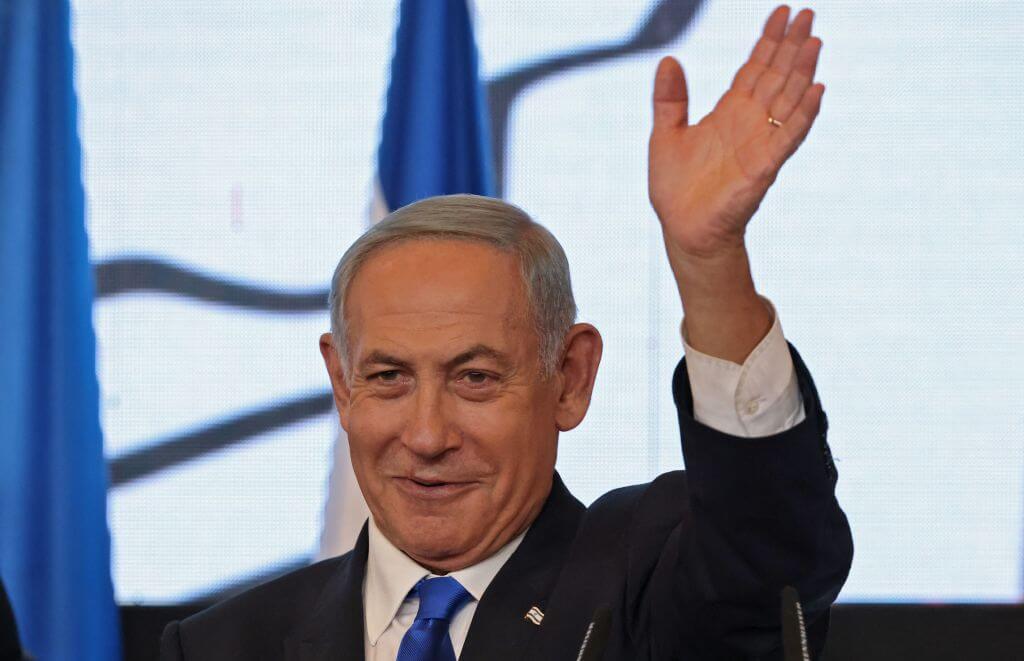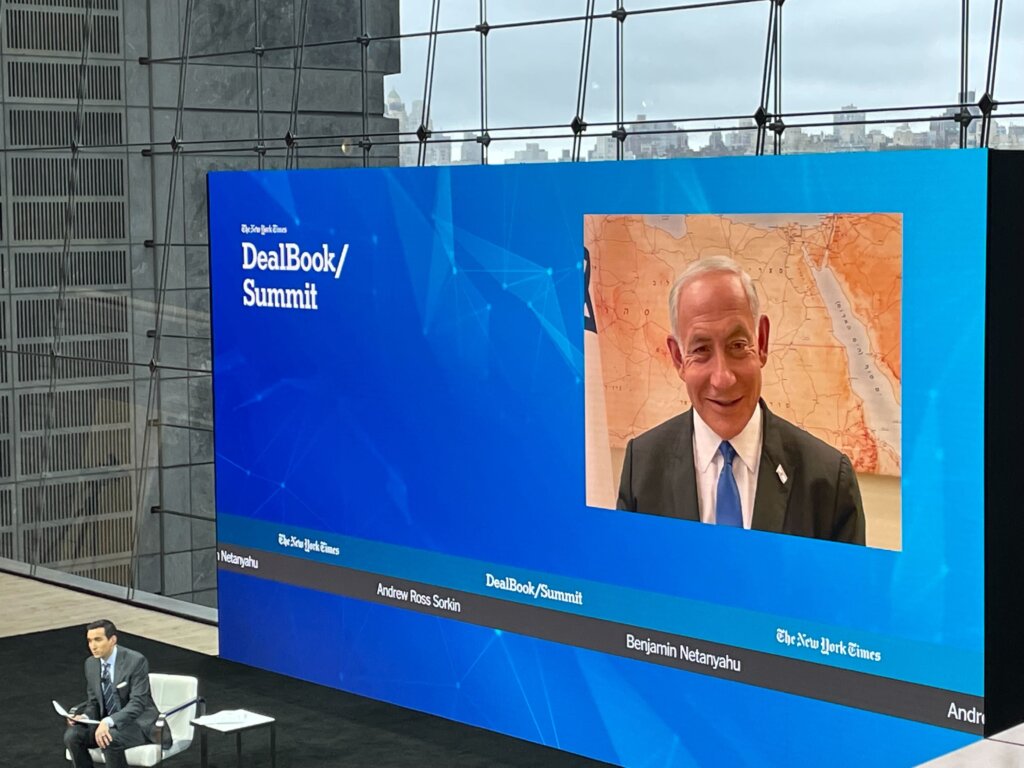Netanyahu seeks to assuage concerns about the new government in outreach to American audiences
‘This Israel is not going to be governed by Talmudic law,’ the incoming prime minister said about his pact with Haredi and extremist parties

Israel’s ex-premier and leader of the Likud party Benjamin Netanyahu addresses supporters on Nov. 2, 2022. Photo by RONALDO SCHEMIDT/AFP via Getty Images
Benjamin Netanyahu, Israel’s prime minister-designate, sought Wednesday to preempt growing concern about the sixth government he is expected to lead, which will include far-right extremists in senior cabinet positions.
“I think there’s a greater chance that will happen under my leadership,” Netanyahu said about the prospects of peace with the Palestinians in a virtual appearance at The New York Times DealBook summit, an annual daylong gathering with power brokers in the finance, markets and political industries, at New York’s Lincoln Center.
The head of the right-wing Likud Party said in a 40-minute conversation with columnist Andrew Ross Sorkin that he has the “credibility” to make peace with Arab nations in the Middle East and Gulf region, which he said would “ultimately lead to the immediate peace with the Palestinians.”
And in a podcast interview with Bari Weiss, a former opinion editor at The New York Times, Netanyahu said that the “doom projections” of a danger to Israel’s democracy are unwarranted. “The main policy or the overriding policy of the government is determined by the Likud and frankly, by me,” he said. “I think I have more than a modest influence on it.”
The incoming Israeli leader hasn’t granted any interviews to the mainstream Israeli media in recent months, but has addressed a diverse range of American audiences, predominantly discussing his recently-published memoir, Bibi: My Story.
The Wednesday session by The New York Times, called “Return to office: How Netanyahu may change global politics (again),” focused primarily on Israeli foreign policy with regard to Iran, Russia and China. Earlier in the day at the conference, Ukrainian President Volodymyr Zelenskyy pleaded for Israeli military assistance. The last two governments that were solely headed by Netanyahu, in coalition with some centrist parties, frequently feuded with the U.S. administration officials. Democratic members of Congress criticized him for publicly opposing former President Barack Obama’s Iran policy and for failing to make progress on the Israeli-Palestinian conflict.
Netanyahu said one of the reasons he decided to seek the premiership and deal with “the buggy mess of Israeli politics” is to stop Iran from developing a nuclear bomb. “It is not a joyful way.”
The conference convened as Netanyahu negotiates with right-wing partners to cobble together a governing coalition, which he aims to complete in the coming weeks. Netanyahu has already agreed to make Itamar Ben-Gvir, a provocateur with extremist views, as national security minister with authority over border police in the occupied West Bank and Jerusalem.

His Likud Party, which has 32 seats in the 120-seat chamber, also signed a deal with the anti-LGBT party Noam, giving its sole member control over immigration from the Soviet Union and how the state defines “Jewish identity.” He is also in the final stages of an agreement with far-right Knesset member Bezalel Smotrich, an advocate for extending Israeli sovereignty in the occupied West Bank, to appoint him as finance minister for the next two years.
Former U.S. Ambassador to Israel Daniel Kurtzer and Aaron David Miller, a former U.S. peace negotiator, urged the Biden administration in an op-ed in The Washington Post on Tuesday to limit their interaction with Ben-Gvir and Smotrich and to stop providing Israel offensive weapons or security assistance to the incoming government for actions in the occupied territories.
In the podcast interview with Weiss, which was also featured in her Substack newsletter, Netanyahu, referring to the views of his religious and Haredi partners, said: “This Israel is not going to be governed by Talmudic law. We’re not going to ban LGBT forums.” He added, “We don’t adopt the prohibition of rights to people who deserve it under Israeli law.”
Relationship with Trump
Netanyahu also criticized former President Donald Trump’s meeting with Kanye West, the rapper who changed his name to Ye and who has spewed antisemitic conspiracies, and Nick Fuentes, one of America’s most prominent young white supremacists.
“I thought that was just wrong and misplaced,” he said. “I think he made a mistake. I hope it’s not repeated.”
Netanyahu and Trump had a rocky relationship when they were in power, but one that led to the moving of the U.S embassy to Jerusalem, the U.S. withdrawal from the Iran nuclear deal, the recognition of Israeli control of the Golan Heights and to normalization deals between Israel and several Arab nations.
Following the election of Joe Biden, Netanyahu tweeted his congratulations to the then-president-elect while Trump was still contesting the results, though Netanyahu waited for weeks for a return call after Biden entered office. Trump made profane remarks about Netanyahu’s outreach, calling it a “betrayal.”
On Wednesday, Netanyahu said his views about Trump haven’t changed since both leaders left office.
To Weiss, Netanyahu described Trump as “irreverent.” He also noted that the former president, who recently announced that he will run for the White House in 2024, “has been a tremendous supporter of Israel” and “very supportive of the Jewish people.”
















